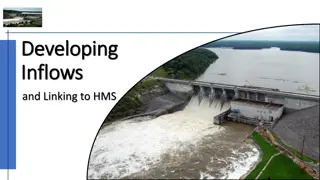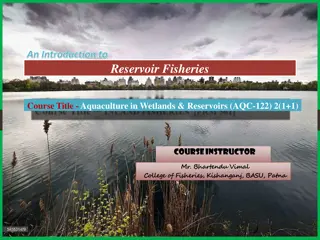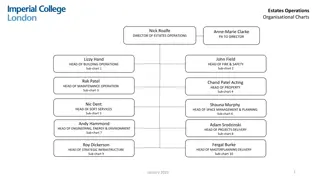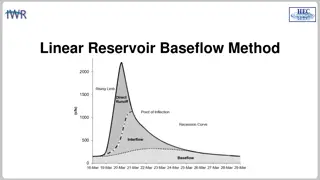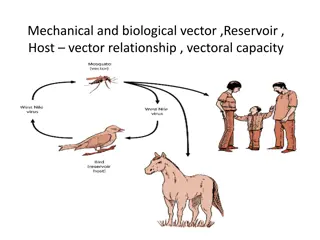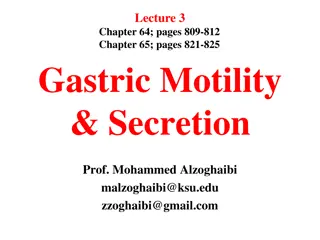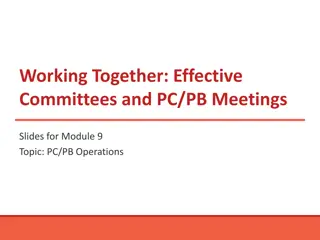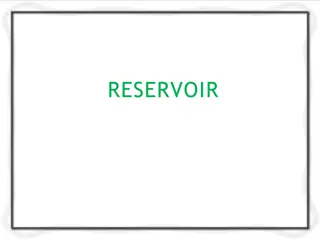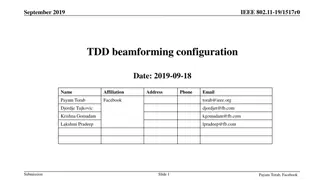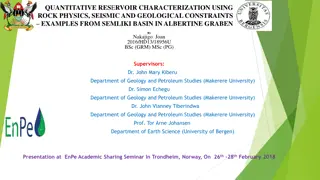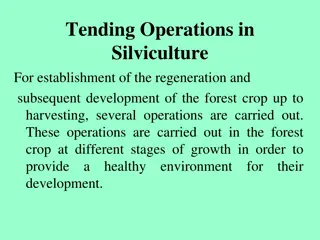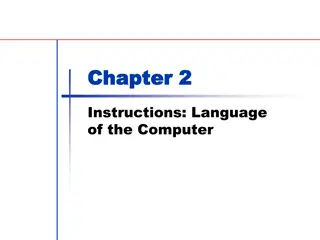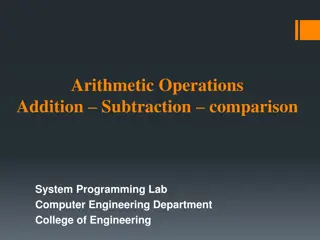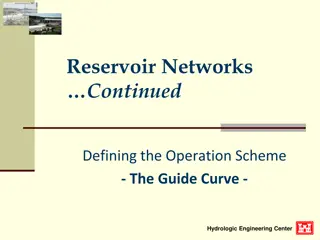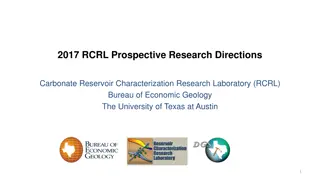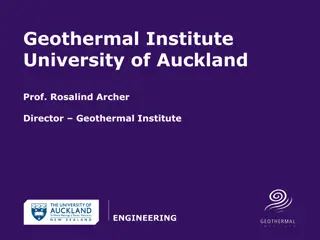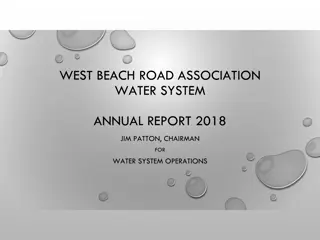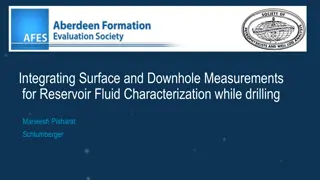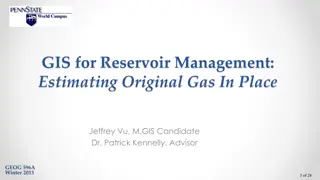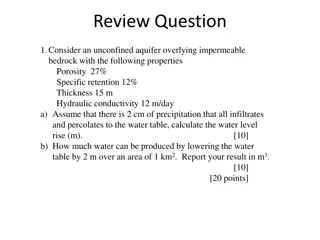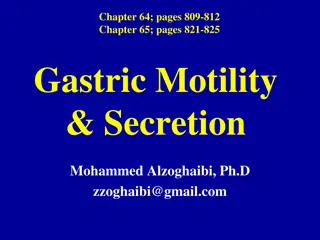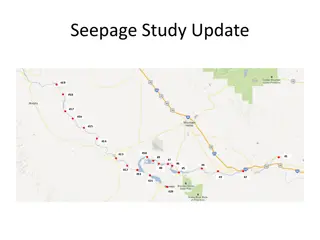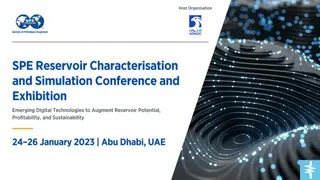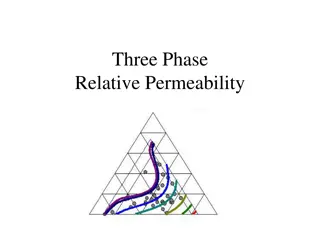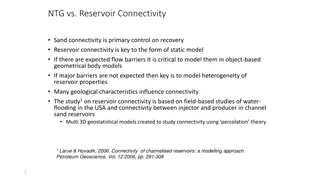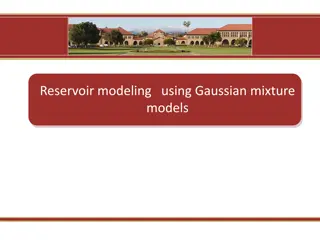Alberta Emergency Management Agency Overview
The Alberta Emergency Management Agency (AEMA) is dedicated to providing strategic leadership in emergency management and business continuity in Alberta. AEMA collaborates with partners and stakeholders to enhance disaster resilience in the region. The agency's structure includes the Managing Direct
3 views • 19 slides
Managing Multiple Purposes in Reservoir Operations
Reservoirs with multiple purposes can present challenges in balancing competing needs such as water supply, flood risk management, hydropower generation, and more. Understanding the interactions between these purposes is essential for optimizing reservoir operations and ensuring reliable water suppl
2 views • 24 slides
Reservoir Storage-Yield Analyses Using HEC-ResSim Lecture #2
This lecture covers the theory of storage-yield analyses, focusing on understanding yield, types of yield like firm yield, methods to calculate yield, and the importance of storing water for re-distribution. It delves into within-year and over-year reservoir storage concepts, illustrating the minimu
7 views • 47 slides
COMPUTER ORGANISATION Register Transfer Language
Register Transfer Language is a symbolic notation used to describe the micro-operations transferring data among registers in computer organisation. It signifies the availability of hardware logic circuits to perform specified micro-operations and transfer results between registers. Register Transfer
7 views • 7 slides
Reservoir Inflows and Computing Methods
Explore the methods for computing reservoir inflows, including mass balance formulas, known and unknown variables, and techniques to handle negative values. Learn about linking to HMS for hydrologic engineering, estimating local inflows, and utilizing smoothing techniques for accurate results.
0 views • 24 slides
Best Car Battery Replacement in Reservoir
Are you looking for the Best Car Battery Replacement in Reservoir? Then contact AutoXpert Thomastown. They specialise in diagnosing and repairing electrical issues in vehicles of all makes and models. Their skilled technicians use the latest diagnostic tools and techniques to ensure accurate and eff
0 views • 6 slides
Overview of Reservoir Fisheries and Aquaculture in India
Reservoir fisheries play a vital role in India's aquaculture sector, with over 19,000 reservoirs covering millions of hectares. These manmade impoundments serve various purposes like irrigation and power generation. The reservoirs are classified into small, medium, and large categories based on thei
1 views • 28 slides
Organisational Structure of Estates Operations Team
The organisational chart depicts the hierarchical structure of the Estates Operations team, led by the Director of Estates Operations. It showcases the various heads and managers responsible for building operations, maintenance, soft services, space management, projects delivery, engineering, energy
0 views • 20 slides
Linear Reservoir Baseflow Method
The linear reservoir baseflow method utilizes linear reservoirs to simulate the movement of water infiltrated into the soil. This method models water movement from the land surface to the stream network by integrating a linear relationship between storage and discharge. Users can select from one, tw
0 views • 11 slides
Reservoir Fisheries and Aquaculture in India
Reservoir fisheries play a crucial role in India, with over 19,000 reservoirs covering millions of hectares. These manmade impoundments serve various purposes such as irrigation and power generation. They are classified based on size into small, medium, and large reservoirs, each with distinct chara
0 views • 28 slides
Vector Relationships and Pathogen Transmission
Understanding mechanical and biological vectors, reservoir hosts, and their role in disease transmission is crucial for effective disease control. Mechanical vectors like flies can transfer pathogens without getting infected, while biological vectors like mosquitoes carry pathogens that reproduce in
1 views • 5 slides
Best Sales Operations Management in the USA
Transform your sales operations with Tjcollinschase.com, the premier provider of Sales Operations Management in the United States. Maximize your profits and simplify your operations today!\n\n\/\/tjcollinschase.com\/services-business\/
3 views • 1 slides
Gastric Motility and Secretion in the Stomach
The stomach plays a crucial role in food processing, acting as a reservoir, preparing chyme for digestion, and facilitating absorption. Divided anatomically and physiologically, it functions as a storage unit and mixing chamber for food. Key motor functions include storage, preparation for digestion
0 views • 49 slides
Strategic Role of Operations Management
The strategic role of operations management involves cost leadership, good/service differentiation, and interdependence with other key business functions. Operations management coordinates activities to add value by producing outputs valued by consumers. The operations department acquires inputs and
0 views • 23 slides
Effective PC/PB Operations for Successful Committees and Meetings
Understanding the importance of operations within PC/PB committees is crucial for fulfilling legislative responsibilities efficiently. This training module covers key objectives such as committee structures, factors to consider in committee structuring, characteristics of successful meetings, managi
0 views • 34 slides
An Overview of Reservoir Types and Purposes
Reservoirs play a crucial role in managing water resources for various purposes like irrigation, hydroelectric power generation, flood control, and more. This article explores different types of reservoirs such as storage, flood control, retarding, and detention reservoirs, along with their function
1 views • 49 slides
IEEE 802.11-19/1517r0 TDD Beamforming Configuration Overview
IEEE 802.11-19/1517r0 discusses TDD beamforming operations related to Beam Measurement in the standard. Before Draft 4.0, these operations were primarily initiated by SME, causing limitations due to proprietary network controllers. The document reviews gaps and improvements in TDD beamforming, aimin
0 views • 10 slides
Root Operations in ICD-10-PCS for Body Part Procedures
An overview of root operations in ICD-10-PCS related to taking out solids, fluids, or gases from a body part, including Drainage, Extirpation, and Fragmentation. Each root operation has specific definitions, examples, and explanations for procedures involving removal or manipulation of solid matter
0 views • 60 slides
Advancing Common Business Operations Overview
Advancing Common Business Operations in November 2019 focuses on key targets and enablers such as Business Operations Strategy, Common Back Offices, Global Shared Service Centers, Common Premises, Mutual Recognition, Client Satisfaction Principles, and Costing & Pricing Principles. The project aims
1 views • 17 slides
Integrated Reservoir Characterization in Semliki Basin, Albertine Graben
Quantitative reservoir characterization using rock physics, seismic, and geological constraints is crucial for hydrocarbon prospect evaluation. This study by Nakajigo Joan explores the integration of these disciplines in the Semliki Basin to improve reservoir property delineation and reduce uncertai
0 views • 24 slides
Tending Operations in Silviculture: A Comprehensive Guide
Tending operations in silviculture are crucial for the establishment and development of forest crops. These operations include weeding, cleaning, thinning, improvement felling, pruning, and climber cutting. Each operation serves a specific purpose in ensuring the healthy growth and development of th
0 views • 23 slides
Computer Organization and Design: Chapter 2
This content discusses shift operations, AND operations, OR operations, EOR operations, and conditional operations in computer organization and design. It covers topics such as shifting logical operations, masking bits, including bits, differencing operations, and conditional branching instructions,
0 views • 22 slides
Overview of 8086 Assembly Language Arithmetic Operations
The 8086 assembly language provides instructions for arithmetic operations such as addition, subtraction, and comparison. These operations are essential for manipulating data in memory and registers. The instructions support various operand types, including registers, memory locations, and immediate
3 views • 24 slides
Reservoir Operation Schemes: Guide Curves and Rules
Delve into the intricacies of reservoir operations through concepts like guide curves, zones, rules, and operation sets. Discover the essential elements that govern the decision-making process for storing and releasing water from reservoirs, ensuring optimal management and resource utilization.
1 views • 15 slides
Geomechanical Effects of Oilfield Chemicals on Sand Failure in Reservoir Rocks
This study by Elizabeth O. Wuyep et al. explores the geomechanical effects of oilfield chemicals on sand failure in reservoir rocks. It discusses the role of oilfield chemicals, limitations of previous works, experimental flow chart, and static saturation tests. The research emphasizes the need for
0 views • 25 slides
RCRL Prospective Research Directions in Carbonate Reservoir Characterization
The RCRL group at the University of Texas at Austin specializes in research on carbonate reservoirs at various scales, from nanopores to basin architecture. They focus on developing predictive relationships and tools for reservoir characterization based on subsurface datasets and outcrop analogs. Th
1 views • 12 slides
Geothermal Institute at University of Auckland - Advancing Renewable Energy Solutions
The Geothermal Institute at University of Auckland, led by Prof. Rosalind Archer, specializes in geoscience, reservoir engineering, and renewable energy technologies. Their research projects range from fundamental geoscience to societal implications in energy markets. The institute offers educationa
0 views • 13 slides
West Beach Road Association Water System Annual Report 2018 Summary
The West Beach Road Association Water System released its annual report for 2018, highlighting the current status of water system operations, finances, and compliance with WAC rules. The report discusses the infrastructure and recapitalization plans in detail. It also emphasizes the need to establis
0 views • 10 slides
Utilizing Integrated Measurements for Reservoir Fluid Characterization while Drilling
This presentation focuses on the integration of surface and downhole measurements to characterize reservoir fluids while drilling. Topics covered include mud gas data acquisition and evaluation, gas analysis while drilling, challenges in tight and abrasive formations, and environmental corrections s
0 views • 23 slides
Estimating Original Gas In Place for Reservoir Management
This study focuses on utilizing GIS technology to estimate Original Gas In Place (OGIP) for reservoir management, with the aim of enhancing oil and gas production, reducing risks, and optimizing recovery. The project outlines the background of reservoir management, introduces the process of volumetr
0 views • 24 slides
Hydrogeology and Water Resource Management Problems
The content contains four challenging problems related to hydrogeology, evaporation, watershed hydrology, and flood control reservoir operations. It covers topics such as water table rise, evaporation rate calculation, unit hydrograph analysis, detention basin filling, and reservoir inflow routing.
0 views • 4 slides
Gastric Motility and Secretion in the Stomach: Functions and Division Overview
The stomach plays crucial roles in food storage, chyme preparation, water absorption, and slow emptying into the small intestine. Its motor functions include maintaining a reservoir, mixing food, and facilitating relaxation reflexes for optimal digestion. Anatomically and physiologically, the stomac
0 views • 46 slides
Multiphase Flows in the Upstream: A Comprehensive Overview
This content delves into the complexities of multiphase flows in the upstream sector, covering topics such as reservoir management, drilling, subsurface imaging, and reservoir modeling. It explores the challenges of multi-scale phenomena, multi-physics interactions, uncertainty, and inversion in the
0 views • 4 slides
Comprehensive Integration of 4D Seismic & Production Data for Norne Reservoir Management
This presentation by Nan Cheng of Statoil in 2013 focuses on the integration of 4D seismic and production data for reservoir management at the Norne Oil Field in Norway. Covering topics such as field structure, zones, official reserves, production profiles, and subsea development solutions, it provi
0 views • 17 slides
Snake River Waters: A Visual Journey
Embark on a visual adventure through images showcasing the beauty of Snake River and CJ Strike Reservoir. Witness the serene seepage study updates, captivating views of CJ Strike Reservoir with its white caps, and the picturesque landscapes of Snake River near Murphy and Bliss. Let these stunning im
0 views • 6 slides
SPE Reservoir Characterisation and Simulation Conference 2023 in Abu Dhabi, UAE
Explore the latest advancements in reservoir characterisation and simulation at the SPE Conference in Abu Dhabi on 24-26 January 2023. Engage with industry experts, discover cutting-edge technologies, and network with peers in this premier event dedicated to the oil and gas sector. The conference fe
0 views • 6 slides
Three-Phase Relative Permeabilities in Reservoir Engineering
Explore the application, correlations, and traditional assumptions of three-phase relative permeabilities in reservoir engineering. Learn about saturation-dependencies, occupancy models, and the challenges of measuring three-phase relative permeabilities. Discover how to calculate three-phase permea
1 views • 14 slides
Reservoir Connectivity and Its Impact on Recovery Models
Sand connectivity plays a crucial role in reservoir recovery, with reservoir properties' heterogeneity influencing connectivity. Field-based studies in the USA focus on water-flooding and injector-producer connectivity in channel sand reservoirs. Geostatistical models using percolation theory help s
0 views • 4 slides
Reservoir Modeling Using Gaussian Mixture Models
In the field of reservoir modeling, Gaussian mixture models offer a powerful approach to estimating rock properties such as porosity, sand/clay content, and saturations using seismic data. This analytical solution of the Bayesian linear inverse problem provides insights into modeling reservoir prope
0 views • 10 slides
Reservoir Road Surgery PPG Meeting Overview
In this overview, discover the changes implemented at Reservoir Road Surgery since COVID-19, including accessibility measures, doctor appointments, phone operations, prescription options, and upcoming improvements. Learn about the increased availability of GPs, appointment procedures, and enhanced p
0 views • 11 slides




